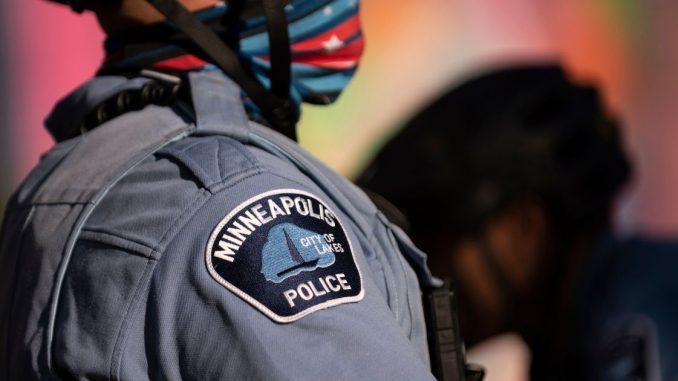
Former Minneapolis police officer Derek Chauvin was found guilty of murdering George Floyd last week, and now the Justice Department is reportedly considering filing charges against him over an incident in 2017 in which he was accused of using excessive force against a minority teenager.
In the wake of the landmark trial which came to a conclusion on Tuesday, Chauvin’s entire 19-year law enforcement career is now apparently under the microscope of the federal government.
ABC News reported that prosecutors were unsuccessful in having police body camera videos from a 2017 incident introduced into evidence in the Floyd case. Such evidence would have been used to show to jurors that Chauvin’s career was marred by instances in which he engaged in callous behavior toward minority suspects of alleged crimes.
The DOJ is now reported to be focusing on the same videos.
Videos from Sept. 4, 2017, per ABC, showed Chauvin “striking a Black teenager in the head so hard that the boy needed stitches, then allegedly holding the boy down with his knee for nearly 17 minutes, and allegedly ignoring complaints from the boy that he couldn’t breathe.”
That incident occurred after a mother reportedly called police to say that her 14-year-old son had attacked her, as had her daughter. The adolescent boy was reported to have defied Chauvin’s commands to comply and get on the ground, before the then-officer decided to use force.
Chauvin arrested the teen for domestic assault against his mother and the teen left the scene in an ambulance and required stitches.
Matthew Frank, who led the prosecution against Chauvin on behalf of the state in the Floyd case — and wanted the 2017 incident introduced as evidence — argued that the videos from the takedown of the teen demonstrated “a far more violent and forceful treatment of this child than Chauvin describes in his [incident report].”
“As was true with the conduct with George Floyd, Chauvin rapidly escalated his use of force for a relatively minor offense,” Frank added.
“Just like with Floyd, Chauvin used an unreasonable amount of force without regard for the need for that level of force or the victim’s well-being. Just like with Floyd, when the child was slow to comply with Chauvin and [the other officer’s] instructions, Chauvin grabbed the child by the throat, forced him to the ground in the prone position, and placed his knee on the child’s neck with so much force that the child began to cry out in pain and tell Chauvin he could not breathe.”
Chauvin, in the incident with the 14-year-old boy, was accused by prosecutors in the Floyd case of using “unreasonable force towards this child and complete disdain for his well-being.”
Chauvin’s attorney Eric Nelson successfully suppressed the state from introducing the 2017 incident as evidence in the Floyd trial.
The attorney told the court that in the 2017 case, “[A] mother had been physically assaulted by her children,” and argued that Chuavin’s use of force was “cleared” as being appropriate by the Minneapolis Police Department.
“It was reasonable and authorized under the law as well as MPD policy,” Nelson noted.
Although the jury never heard the details of the incident, the Justice Department is reportedly interested in exploring taking up a case against Chauvin on behalf of the then-minor.
The department, under the lead of Attorney General Merrick Garland, is already in the midst of a civil investigation into the Minneapolis Police Department to determine whether its officers have used racially discriminatory policing tactics and excessive force as a pattern.
But the ABC report is jarring in that it signals that the federal government might come after Chauvin — whose previous actions were, at the time they occurred, never an issue with department supervisors.
This of course brings up serious questions regarding what the motives for President Joe Biden’s heavily-politicized DOJ are, as for now it is implied the department intends to retroactively seek justice for an incident in which no crime was reported to have occurred.
While officers are and should be held to the highest of standards with regard to how they conduct their jobs, and how they interact with alleged crime suspects and others, reports that federal investigators might begin going through Chauvin’s career with a fine-tooth comb are disturbing, considering their potential wider consequences.
Should the DOJ drop the hammer on Chauvin over a nearly four-year-old incident involving an alleged violent and non-compliant teen, this could set a precedent where other officers in other departments are retroactively targeted over incidents in which they used their training appropriately to keep peace and protect public safety — but were accused of being heavy-handed.
Chauvin has already been convicted in Floyd’s death. The fact that he might soon become a defendant in another case could signal that the federal government is not seeking justice, but revenge or a retroactive reckoning against policing as we know it. Cops are rightly granted the benefit of the doubt that they will conduct their jobs professionally, appropriately and with justified force — when necessary.
If the DOJ indeed comes after Chauvin, the department would, in effect, undermine a nationwide system in which officers, by virtue of them passing necessary training and psychological examinations, are presumed to go on and act as stewards for justice and equal application of the law.
While reviewing police practices is healthy to ensure police departments stay in line with the ethical enforcement of laws and statutes, Garland’s political Justice Department might further diminish the essential element of trust that must exist between police officers and the communities they serve.
